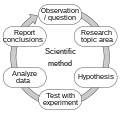Scientific method
Scientific Method
The Scientific method is a systematic and logical approach to discovering how things in the universe work. It is the process by which scientists, collectively and over time, endeavor to construct an accurate (that is, reliable, consistent and non-arbitrary) representation of the world.
History[edit]
The history of the scientific method is a fascinating and long one, going back to the ancient Greeks and continuing through the Middle Ages and the Renaissance. The modern scientific method crystallized in the 17th century with the work of Galileo and Newton, but it has been evolving ever since, and it continues to be the subject of intense debate and reconsideration among scientists and philosophers of science.
Steps of the Scientific Method[edit]
The scientific method typically follows these steps:
- Observation: The first step in the scientific method is to make an observation about the world around you.
- Question: After making an interesting observation, a scientific mind itches to find out more about it. Thus, the second step in the scientific method is to form a question that can be answered by making more observations and/or doing experiments.
- Hypothesis: A hypothesis is a tentative explanation for the observation or answer to the question. It is something that can be tested by further observations or experiments.
- Experiment: An experiment is a controlled way of testing a hypothesis. Experiments are designed to be repeatable, and they should have both a control group and a variable group.
- Analysis: After the experiment, the data collected is analyzed to see if it supports or contradicts the hypothesis.
- Conclusion: The conclusion is a summary of the research and the results of the experiment. This is where the scientist also states whether the hypothesis was correct or not.
Importance of the Scientific Method[edit]
The scientific method is important because it is an evidence-based method for acquiring knowledge. Unlike intuitive, philosophical or religious methods for gaining understanding about the universe, the scientific method relies on empirical, measurable evidence subject to specific principles of reasoning.
Criticisms and Limitations[edit]
While the scientific method is universally accepted as the most reliable way to gather knowledge, it is not without its critics. Some critics argue that the scientific method is too rigid and limits the scope of what can be studied. Others argue that it is subject to bias and interpretation, and that it cannot answer questions about values or what should be.
See Also[edit]
References[edit]
<references />
Ad. Transform your life with W8MD's Budget GLP-1 injections from $49.99


W8MD offers a medical weight loss program to lose weight in Philadelphia. Our physician-supervised medical weight loss provides:
- Weight loss injections in NYC (generic and brand names):
- Zepbound / Mounjaro, Wegovy / Ozempic, Saxenda
- Most insurances accepted or discounted self-pay rates. We will obtain insurance prior authorizations if needed.
- Generic GLP1 weight loss injections from $49.99 for the starting dose of Semaglutide and $65.00 for Tirzepatide.
- Also offer prescription weight loss medications including Phentermine, Qsymia, Diethylpropion, Contrave etc.
NYC weight loss doctor appointmentsNYC weight loss doctor appointments
Start your NYC weight loss journey today at our NYC medical weight loss and Philadelphia medical weight loss clinics.
- Call 718-946-5500 to lose weight in NYC or for medical weight loss in Philadelphia 215-676-2334.
- Tags:NYC medical weight loss, Philadelphia lose weight Zepbound NYC, Budget GLP1 weight loss injections, Wegovy Philadelphia, Wegovy NYC, Philadelphia medical weight loss, Brookly weight loss and Wegovy NYC
|
WikiMD's Wellness Encyclopedia |
| Let Food Be Thy Medicine Medicine Thy Food - Hippocrates |
Medical Disclaimer: WikiMD is not a substitute for professional medical advice. The information on WikiMD is provided as an information resource only, may be incorrect, outdated or misleading, and is not to be used or relied on for any diagnostic or treatment purposes. Please consult your health care provider before making any healthcare decisions or for guidance about a specific medical condition. WikiMD expressly disclaims responsibility, and shall have no liability, for any damages, loss, injury, or liability whatsoever suffered as a result of your reliance on the information contained in this site. By visiting this site you agree to the foregoing terms and conditions, which may from time to time be changed or supplemented by WikiMD. If you do not agree to the foregoing terms and conditions, you should not enter or use this site. See full disclaimer.
Credits:Most images are courtesy of Wikimedia commons, and templates, categories Wikipedia, licensed under CC BY SA or similar.
Translate this page: - East Asian
中文,
日本,
한국어,
South Asian
हिन्दी,
தமிழ்,
తెలుగు,
Urdu,
ಕನ್ನಡ,
Southeast Asian
Indonesian,
Vietnamese,
Thai,
မြန်မာဘာသာ,
বাংলা
European
español,
Deutsch,
français,
Greek,
português do Brasil,
polski,
română,
русский,
Nederlands,
norsk,
svenska,
suomi,
Italian
Middle Eastern & African
عربى,
Turkish,
Persian,
Hebrew,
Afrikaans,
isiZulu,
Kiswahili,
Other
Bulgarian,
Hungarian,
Czech,
Swedish,
മലയാളം,
मराठी,
ਪੰਜਾਬੀ,
ગુજરાતી,
Portuguese,
Ukrainian








